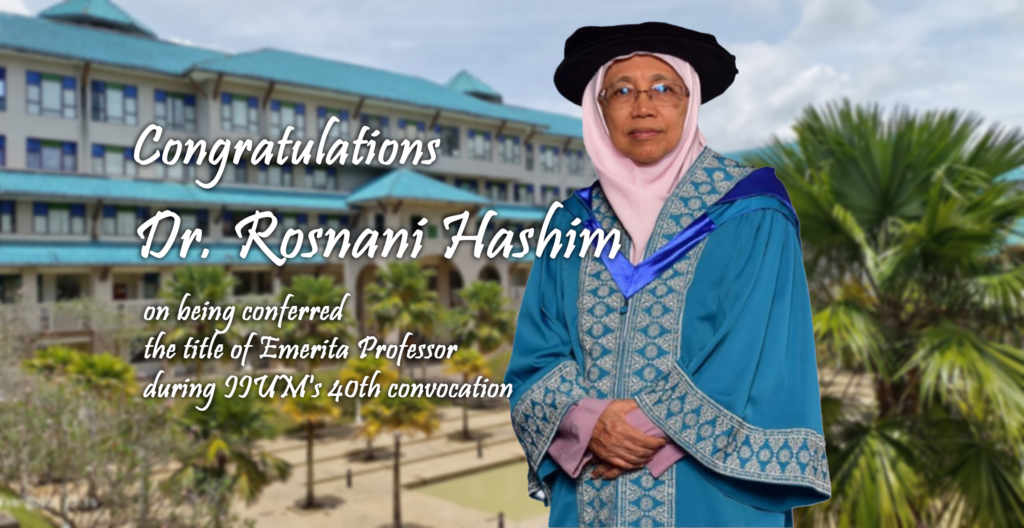Emerita Prof. Dr. Rosnani Hashim Congratulations to Dr. Rosnani Hashim on being conferred the title of Emerita Professor during IIUM’s 40th convocation. This recognition is a testament to your outstanding contributions to the field of education and your unwavering dedication to academic excellence. Your research, teaching, and mentorship have left a lasting impact on countless students and colleagues. We are proud to celebrate your achievements and wish you continued success in your future endeavors. Dr. Rosnani’s academic journey began with a strong foundation in both Western and Islamic educational traditions. She earned a bachelor’s degree in mathematics from Northern Illinois, followed by a Master’s degree in Curriculum and Instruction from the University of Wisconsin Madison and a Ph.D. in Social Foundations of Education from University of Florida. Her areas of specialisation, social foundations i.e. philosophy, history and sociology of education, as well as curriculum development, mathematics education, and the pedagogy of philosophical inquiry, have allowed her to make significant contributions to both theory and practice in these fields. Additionally, she has enriched her credentials with a Diploma in Translation and professional certificates in leadership and philosophical inquiry, equipping her with a broad and diverse perspective on education. Dr. Rosnani’s career at I IUM began in 1987, where she became a pioneering figure in the development of the Kulliyyah of Education. Under her leadership as head of the Kulliyyah, she oversaw the expansion of its programmes, introducing Bachelor’s, Master’s, and Doctoral degrees in education. One of her significant achievements during this time was the establishment of the IIUM International Islamic School {IISM). Her strategic guidance as the Chairman of the Board of Directors of Setiabudi and IISM not only transformed the school financially but also saw the development of a teacher training programme and the production of Islamic Studies textbooks for Grades 1-6, which further enriched the educational experience of the students. She also played a pivotal role in the establishment of the IIUM Educare and Islamic Parenting Course, initiatives that continue to benefit the University community and society at large. Dr. Rosnani’s leadership extended beyond IIUM, as her dedication to advancing teaching and thinking skills is evident in her efforts in setting up the Centre for Teaching Thinking, which gained international recognition under her stewardship. This initiative, in collaboration with IIIT East and Southeast Asia (ESEA), introduced the Hikmah Pedagogy and lslamisation of Knowledge for training teachers both face-to-face and online. The Hikmah pedagogy’s success attracted attention from countries like Uganda, whose National Curriculum Development Centre sought training for their educators. She has inspired educators beyond Malaysian border such that a university in Thailand has named a female leadership in private Islamic school award after her as a powerful symbol of empowering women in educational leadership. Dr. Rosnani’s excellence in teaching and research has earned her numerous accolades, including the Academic Icon Award which is the highest award for academics at IIUM in 2019. She has shared her expertise with students and scholars around the world, teaching in countries such as the USA, Japan, Syria, Turkey, and Uganda. With over 20 doctoral and master’s students graduating under her supervision. Dr. Rosnani’s legacy continues through the next generation of educators. A prolific writer and researcher, Dr. Rosnani is widely respected for her scholarship on educational dualism, the integration of curriculum, and the lslamisation of knowledge {IOK). She is an advocate for incorporating philosophical inquiry into the Muslim curriculum and has authored seminal works which earned national accolades. Dr. Rosnani’s contributions to education extend beyond her research. Her practical work, such as the curriculum and teacher training for the implementation of the Integrated Curriculum forSecondary Schools (KBSM), advocacy for the establishment of government-aided religious schools (SABK), and the introduction of school-based assessments with the KSSR, reflect her commitment to improving education at the national level. Her introduction of the Hikmah Pedagogy and the Fast Track lqra method for enhancing Arabic/ Qur’anic literacy have also been widely recognised, earning her multiple awards at the University and national levels. In recognition of her tireless service to IIUM. her leadership in educational reforms, and her global contributions to the field of education, Dr. Rosnani Hashim is a deserving recipient ofthe Emerita Professorship. Her career stands as a testament to the power of education to transform lives, shape societies, and bridge cultures.



